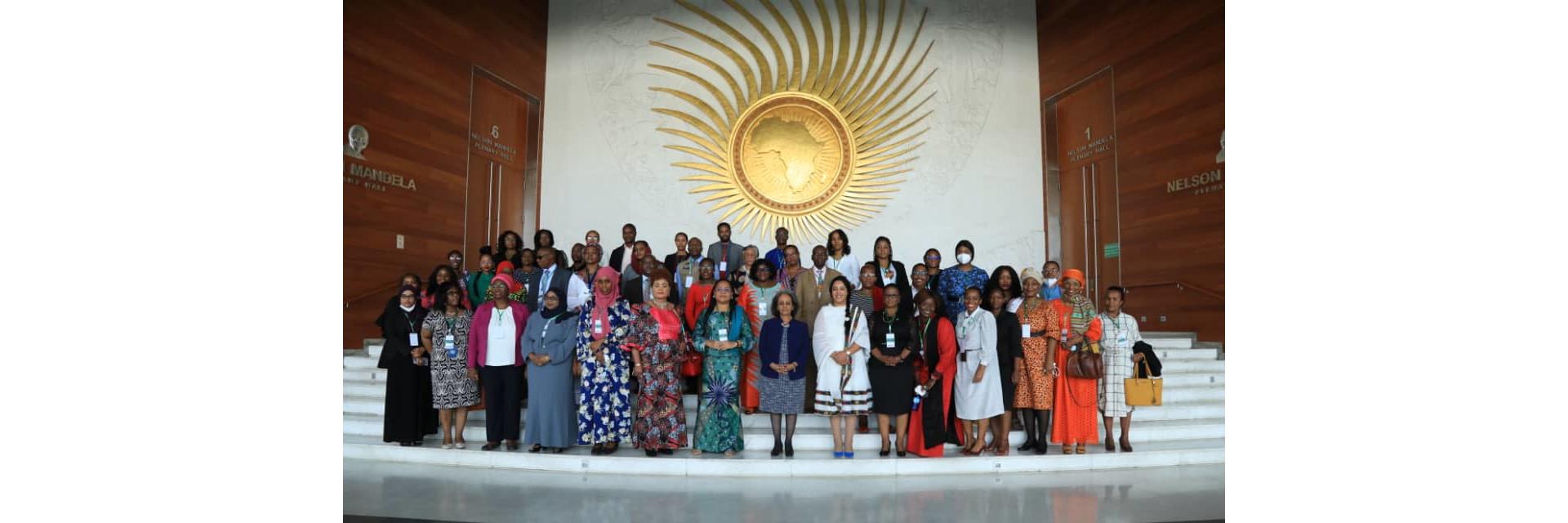Addis Ababa, 4 March 2022– Women and girls should be at centre stage in the fight for climate justice and a transformative shift towards a disaster-proof Africa. This was a recurring message when women’s affairs ministers and senior officials from across Africa met in Addis Ababa on 28 February for the ministerial segment of the Africa Consultation on the 66th session of the Commission on the Status of Women (CSW).
Organised by the African Union Commission, UN Women and the United Nations Economic Commission for Africa (ECA), the theme of this year’s consultation focused on ‘achieving gender equality and the empowerment of all women and girls in the context of climate change, environmental and disaster risk reduction policies and programmes’.
In her opening remarks, the President of Ethiopia, H.E. Sahle-Work Zewde, said: “The theme of this year is extremely important because it touches on the lives of millions of African women who are facing climate change and natural disaster effects. I want us to appreciate that the women who face these problems also have the solutions. This is, therefore, to invite our respective countries to have consultations with the concerned parties. This is their reality and they are surviving these effects every day, therefore their inputs are incredibly valid.”
She continued: “Our approach to women in leaders as a solution for some of the long-standing issues which plague our continent needs to be cognisant of a leadership that cascades down and empowers all women in the ways they require. Our duty is not only to deliver on our respective mandates but also towards upgrading other women… Deliberate interventions such as these will ensure our efforts reach as many African women and youth within this critical decade where we are all called to action.”
According to UN studies, women are more vulnerable to the impacts of disasters, especially climate change, due to the longstanding gender inequalities. Women form a majority of the world’s poor, often dependent on small-scale farming for their livelihoods and can comprise 80 per cent of those displaced by climate-related disasters. At the same time, research shows that empowering women through improved healthcare, education and representation in government could help societies adapt more quickly and easily to the impacts of a changing climate.
Speaking at the consultation, Ethiopia’s Minister for Women and Social Affairs, H.E. Ergogie Tesfaye, said: “Addressing climate change and environmental risks and ensuring gender equality will be the two key factors for achieving the targets of the Sustainable Development Goals (SDGs). Approaching climate change and environmental risks in a gender-sensitive manner is imperative.”
She added: “In recognition of women’s traditional role in managing natural resources at family and community levels, achieving their full and effective participation and decision-making in all interventions on climate, disaster and environmental risks is essential.”
Echoing the Minister Tesfaye’s words, Ms. Edlam Yemeru, acting Director of ECA’s Gender Poverty and Social Policy division, said: “The COVID-19 pandemic has revealed enormous vulnerabilities and risks, as well as the limitations to our preparedness to respond to such shocks now and in the future. Addressing climate change and disaster risk has never been more urgent, which is not possible without placing gender equality and women’s empowerment at the centre.”
Ms. Yemeru continued: “In Africa, climate change presents one of the most challenging threats to inclusive and sustainable development, although the continent contributes the least carbon emissions. It is a shock for which Africa must prepare, learning from the COVID-19 experience.”
She described the regional consultation as a “strategic opportunity for the continent to secure greater awareness and action” for ensuring all efforts on climate change and disaster risk reduction are fully gender-responsive.
The consultation participants also included the Deputy Chairperson of the African Union Commission, Dr. Monique Nsanzabaganwa, and representatives from intergovernmental agencies and gender experts from civil society organisations.
The outcome statement from the consultation will shape a pan-African position on gender and women’s empowerment in the context of climate change and disaster risk reduction, which will inform the discussions at the 66th CSW session, taking place from 14-25 March 2022 in New York City.
Issued by:
Communications Section
Economic Commission for Africa
PO Box 3001
Addis Ababa
Ethiopia
Tel: +251 11 551 5826
E-mail: eca-info@un.org

